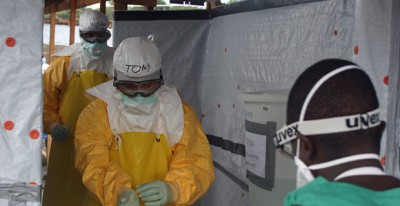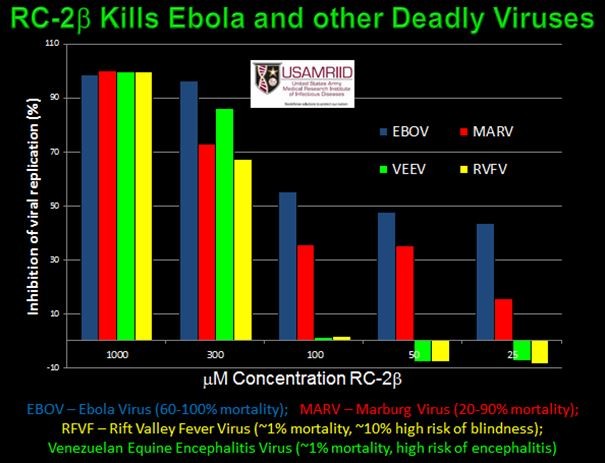Doctor: U.S. Army Rejected Successful Ebola Drug 2 Weeks Before Outbreak
Exclusive: Former flight surgeon had been working with Ft. Detrick to develop treatment

A doctor claims that he
developed a successful drug to combat Ebola with the U.S. Army at Ft.
Detrick Maryland but that the research was inexplicably shut down two
weeks before the first outbreak of the virus in West Africa.
Richard C. Davis, M.D., a
former flight surgeon with the U.S. Navy, told Infowars that he was
leading a project to develop a drug called RC-2Beta, which according to
Davis works, “at the core of our cells to enhance mitochondrial
efficiency and promote gene signaling to stimulate cellular self-repair
and pathogen destruction.”
In the fall of 2013, Davis’
company began collaborating with the US Army at their Level 4
bioweapons facility at Ft. Detrick, Maryland to develop the drug, with
astounding success.
According to Davis, the
drug “Killed four of the world’s deadliest viruses in a dose-dependent
fashion. The Army also noted that uninfected cells in the same cultures
were untouched by the drug (i.e., it was non-toxic).”
“Everyone was very excited
about these results since there has never been a broad-spectrum
anti-viral drug that killed so many different viruses without affecting
normal (uninfected) cells in this way,” writes Davis.
However, after the Army
initially indicated to Davis and his team that they were ready to move
ahead quickly with further testing, communication completely ceased.
Army research data shows effectiveness of RC-2Beta in fighting the Ebola virus.
“Our once close
communications and cordial relationship with the Ft. Detrick team went
totally and inexplicably silent. Our phone calls went unanswered and
emails unreturned,” writes Davis, adding he was “stunned” when the first
reports of Ebola emerged in Africa just two weeks later.
The doctor also desperately
contacted mainstream media outlets in an effort to get the story out,
including CNN, ABC, MSNBC, CBS, the New York Times, the Washington Post,
the LA Times and others. After making initial contact and agreeing to
provide documents, Davis was subsequently stonewalled and every outlet
dropped the story.
Davis then turned to
Florida Congressman David Jolly in an effort to reopen lines of
communication with Ft. Detrick, a process that is ongoing.
While health authorities
and the media aggressively promoted ZMapp and other less successful
drugs and vaccines to fight Ebola, Davis set about anxiously contacting
the World Health Organization, which in June announced that experimental
treatments for Ebola would be fast tracked.
“Out of concern and
frustration, I made it my personal priority to obtain the two necessary
documents (Humanitarian Use Exemption and Export Certificate) needed to
ship our drug to the medical teams working desperately in Africa,”
writes Davis. “So I began calling, and writing and faxing everyone who
might be able to help. Since May, I have reached out over 200 times to
every head of every organization in the world involved with this crisis.
This includes the World Health Organization, the Centers for Disease
Control, the various teams at the FDA, the National Institutes of
Health, DARPA, multiple private relief and aid organizations (like
Doctors Without Borders), and dozens just like them. The response was
always the same… Silence…”
The doctor also slammed the Obama administration’s response to the Ebola outbreak.
“The response of the
American government has been patently absurd,” writes Davis. “Every
protocol that has been put in place to prevent the spread of the disease
has been ignored. Our borders remain open, infected patients are being
brought into our hospitals, and no truly effective countermeasures have
been erected to stem the tide of infectious risk.”
Davis’ conclusion on the
government’s handling of the Ebola crisis and the fact that a
potentially successful cure for the virus was shut down by Ft. Detrick
immediately before the outbreak in West Africa left him to draw a
sobering conclusion.
“I am left to conclude that
America’s leadership is either guilty of gross misconduct, dereliction
of duty, criminal negligence or worse – treason,” writes Davis, warning
that the “crisis will undoubtedly spiral out of control” if the advice
of incompetent public health authorities, the government and the media
continues to be followed unquestionably.
Davis boasts an impressive
Curriculum Vitae, having authored over 400 patents and trademarks while
also being awarded commendations from the Chief of Naval Operations.
“The inescapable
conclusions of negligence or corruption or both cannot be simply swept
aside for the sake of political correctness when the lives of every one
of us are at stake,” writes Davis, adding, “Ebola is real. It is here,
now. There is no more time to waste.”
Paul Joseph Watson is the editor at large of Infowars.com and Prison Planet.com.




No comments:
Post a Comment